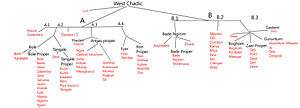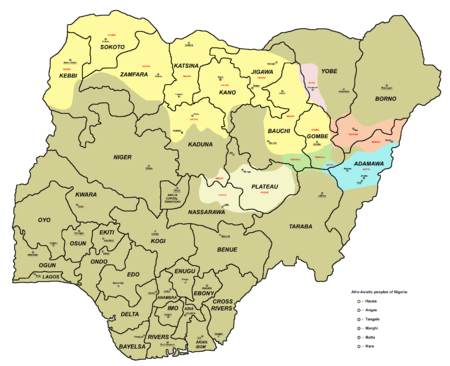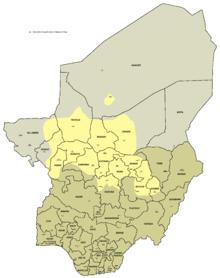West Chadic languages
The West Chadic languages of the Afro-Asiatic family are spoken principally in Niger and Nigeria. They include Hausa, the most populous Chadic language and a major language of West Africa.
| West Chadic | |
|---|---|
| Geographic distribution | Nigeria, Niger |
| Linguistic classification | Afro-Asiatic
|
| Subdivisions |
|
| Glottolog | west2785[1] |
 West Chadic per Newman (1977) | |

Main Chadic-speaking peoples in Nigeria.

Hausa-speaking areas in Nigeria and Niger
Languages
The branches of West Chadic go either by names or by letters and numbers in an outline format.[2]
- Hausa–Gwandara (A.1): Hausa, Gwandara
- Bole–Angas (?)
- Bole–Tangale (A.2)
- Angas (Central West Chadic[3]) (A.3)[4]
- Ron (A.4):[5] Fyer, Tambas, Ron (Bokkos, Daffo-Butura, Mangar, Monguna), Shagawu, Duhwa (Karfa), Kulere (Tof, Richa, Kamwai-Marhai), Mundat, Sha
- Bade–Warji (?)
- Barawa (South Bauchi) (B.3)
In addition, Poki is unclassified within West Chadic.
Internal structure
George Starostin's (2010) internal classification of West Chadic[7] as presented in Blažek (2010):[8]
- West Chadic
- West Chadic A
- Hausa–Gwandara
- (branch)
- Ron
- Bole-Angas
- West Chadic B
- Bade–Ngizim
- Bauchi
- West Chadic A
Distribution
Distributions of West Chadic branches:[9]
| Branch | Code | Primary locations |
|---|---|---|
| Hausa–Gwandara | A1 | Northern Nigeria and Niger |
| Bole–Tangale | A2 | Darazo LGA, Bauchi State; Yobe, Taraba, Gombe, Borno states |
| Angas | A3 | Shendam and Mangu LGAs, Plateau State |
| Ron | A4 | Mangu LGA, Plateau State |
| Bade | B1 | Bade LGA, Borno State |
| Warji | B2 | Darazo and Ningi LGAs, Bauchi State |
| Barawa | B3 | Bauchi State (Toro, Dass, Tafawa Balewa, Bauchi LGAs) |
Reconstruction
Although no full reconstruction of West Chadic has been published, reconstructions of numerals for West Chadic and its subgroups have been proposed by Václav Blažek (2018).[8]
Numerals
Comparison of numerals in individual languages:[10]
| Classification | Language | 1 | 2 | 3 | 4 | 5 | 6 | 7 | 8 | 9 | 10 |
|---|---|---|---|---|---|---|---|---|---|---|---|
| A, A.1 | Gwandara | da | bi | úkù / úɡú (Nimbia dialect) | huru / furu (Nimbia dialect) | bìyàri / bìyàr (Nimbia dialect) | ʃídà / ʃídə́ (Nimbia dialect) | bákwè / boʔo (Nimbia dialect) | tákùʃì / táɡə́r (Nimbia dialect) | tárà / tãrã (Nimbia dialect) | ɡóm̀ / ɡóŋ̀ / ɡwóm (Nim. dialect) |
| A, A.1 | Hausa | ɗájá | bíjú | ʔúkù / ʔúkkù (West Hausa) | fúɗú | bìjár | ʃídà / ʃíddà (West Hausa) | bákwài | tákwàs | tárà | ɡóːmà |
| A, A.2, Bole | Bele | móoɗì | bòló | kùnú | fòɗɗó | bàaɗì | bàccímóoɗì | báawùló | ɓóorùɗó (2 x 4) | ɓòowùnò | bìmbáɗí |
| A, A.2, Bole, Karekare | Karekare | wáɗí | bèːlú | kúːnùː | fèːɗú | bàːɗú | bàcóːɗì (5 + 1) | bàcíbèːlú (5 + 2) | fífèːɗú (2 x 4) | ɓànnù | mbáɗ |
| A, A.2, Bole, Bole Proper | Bole | móoɗì | bòláu | kúnùm | pòɗɗó | bàɗì | bàššimóoɗì | báawúló | póorɗó (2 x 4) | ɓòonùm | bìmbáɗí |
| A, A.2, Bole, Bole Proper | Bure (Bubure) | móɗé | máló | kúnú | ʄóɗó | báɗé | básúmé | básùmáló (5+ 2) | ʄórʄóɗó (2 x 4) | ɓárdzìmóɗé (10 - 1) | bárbáɗè |
| A, A.2, Bole, Bole Proper | Galambu | múuri | m̀bàál | kúun | páryá | bòorí | bɪ́címɪ́n | bùcù m̀bàl (5+ 2) | hórró | bàryà múuri (10 - 1) | bár |
| A, A.2, Bole, Bole Proper | Gera | móóyi | mbùlú | kúnú | fúɗú | bàaɗì | bèeshím | bìccìmbùlú (5+ 2) | húrɗú | ɓànìnjà / barija | bàrɗí / barr |
| A, A.2, Bole, Bole Proper | Geruma | mô / mon | m̀bàalú / mbàalúŋ | kúnú / kúnúŋ | fúɗú / húɗúŋ | bàaɗì / bàalí | bècə́m | bàzə̀mbàalú (5+ 2) | húrɗú / úrɗúŋ | ɓár jà | ɓáráɗì / ɓárári |
| A, A.2, Bole, Bole Proper | Kholok (Widala) | ɗók | pèlòw | bùnùm | pèeròw | faàt / faàr | foòròmìnì | paàlìlàw | bìrbìròw / pìrpìròw | kómbóy | ɓùmmò |
| A, A.2, Bole, Bole Proper | Kirfi (Giiwo) | móoɗì | mbàlú | kúnú | fáɗáu | bòoɗ | bìccúuni | bìcímbàlu (5+ 2) | fórfáɗó (2 x 4) | bàr jà móoɗi (10 - 1) | pàtà |
| A, A.2, Bole, Bole Proper | Maaka | mōɗì | bòllu | kūǹ | paɗɗu | bà | bìnkinù | nɡā̀nù or bákwài (< Hausa) | jìlai | kwàlak | bìmba |
| A, A.2, Bole, Bole Proper | Ngamo | mòɗi | bòlò | kùnû | hɔ̀ɗò | bât | bàʔàʃìmòɗi (5 + 1) | babìlò (5 + 2) | hɔɔrɗò (2 x 4) | ɓònù | bimbaɗ (2 x 5) ? |
| A, A.2, Bole, Bole Proper | Nyam | mɔ̀dɔ́ | fùllúk | kùnúŋ | hɔ̀dúk | hwàt | fármé | fáró fùllúk (5 + 2) | húrú ɡùdùk (2 x 4) | láɡó mɔ̀dɔ́ (10 - 1) ? | kùumò (litː ' kumo ' = ear) |
| A, A.2, Tangale, Dera | Dera (Kanakuru) | ɗuwey | rap | kunu | paraw | bât | byême | bwelà | torìmen | wanɗumwe (10 - 1) | ɡûm |
| A, A.2, Tangale, Tangale Proper | Kupto (Kutto) | ɗékkíré | fáláw/ páláw | kùnùŋ | fàɗàw / pàɗàw | fáat / páat | fáyɗìn / páyɗìn | fáyláw / páyláw | fàrfìɗòw | lèbìɗà | kómó |
| A, A.2, Tangale, Tangale Proper | Kushi | ɗòk | pə̀llòw | tàat | péeròw | fwàt / fúwàt | fàràɡbànàŋ | fàrlów | pìdiɗòw | fɔ̀jèràw | kpèmù |
| A, A.2, Tangale, Tangale Proper | Kwaami | múndí | póllów / fóllów | kúnúm | póɗòw / fóɗòw | páaɗí / fáaɗí | páyíndì / fáyíndì (5 + 1) | pópíllów / fófíllów (5 + 2) | pówùrɗòw / fówùrɗòw (2 x 4) ? | làmbáɗà | kúmó |
| A, A.2, Tangale, Tangale Proper | Pero (Pipero) | ɗók | bélòw | ɡ͡bónòŋ | béeɗòw | púat / fwát | páttira múndi | páttira bélòw | bídìdow | kómpòy / kómvòy | kó / k͡púmmò |
| A, A.2, Tangale, Tangale Proper | Piya | mùndí | pèelów | ɡbùnùm | pèeɗòw | fàat | pàtìrà mùndí (5 + 1) | pàtìrà pèelów (5 + 2) | pèdìpìɗów (2 x 4) ??? | kòmbòy | kùmmó |
| A, A.2, Tangale, Tangale Proper | Po Tangale (1) | dɔk | ràp | kúnuŋ | pàdàó | fùwàt | pàíndì | pèláù | pàpádà (2 x 4) | làmbùdà | ɡ͡bɔmɔ |
| A, A.2, Tangale, Tangale Proper | Tangale (Shongom) (2) | dɔ́k | ráp | kúnúŋ | sɛ́rɛɪ̀ | pʊ́wàd | páyɪ̀nɗɪ́ | péelòu | párpàɗá (2 x 4) | lámɓɗà | ɡ͡bɔ́mɔ́ |
| A, A.3, Angas Proper, 1 | Angas (Ngas) | ɡàk | báp | kʷán | fír | pɛ̀t | pìmí (5 + 1) | pòbáp (5 + 2) | pòkʷún (5 + 3) | pòfár (5 + 4) | sàr |
| A, A.3, Angas Proper, 1 | Kofyar | mé | vəl | kún | féer | paàt | pèmə (5 + 1) | pòɡòvəl (5 + 2) | pòɡòkun (5 + 3) | pòɡòfár (5 + 4) | sàr |
| A, A.3, Angas Proper, 1 | Miship (Chip) (1) | kəme | vəl | kun | feer | baat | pemee (5+ 1) | pokvəl (5+ 2) | pokkun (5+ 3) | pokfaar (5+ 4) | sár |
| A, A.3, Angas Proper, 1 | Miship (Chip) (2) | me | vɨl | kun | fɛr | paàt | pemɛ (5+ 1) | pɔ̀ɡɔ̀vɨl (5+ 2) | pɔ̀ɡɔ̀kun (5+ 3) | pɔ̀ɡɔ̀far (5+ 4) | sə̀r |
| A, A.3, Angas Proper, 1 | Cakfem-Mushere | kume | vel | kun | feer | paat | peemee (5+ 1) | feermeekum (4+ 3) ?? | feertiit (4 x 2) ?? | paatmeefeer (5+ 4) | kakapaat (5 x 2) ?? |
| A, A.3, Angas Proper, 1 | Mwaghavul (Mupun / Sura) | mə́ndòŋ | və́l | kún | féer | páat | péemè (5 + 1) | póvə̀l (5 + 2) | pòkún (5 + 3) | pòféer (5 + 4) | kàapàt və́l (5 x 2) ??? |
| A, A.3, Angas Proper, 2 | Goemai (Ankwe) | mée, ɡə̀mée | və́l | kún | fə́r | pʰá:t | pʰə̀mə́ (5 + 1) | pʰə̀və́l (5 + 2) | pʰùkún (5 + 3) | pʰə̀fár (5 + 4) | sár |
| A, A.3, Angas Proper, 2 | Tal | [mɛ́nɛ] | [vɨ́ɛ́l] | [kún] | [fɛi] | [pàːt] | [pɨ̀mɛ́] | [mɛ́fɛ́imɛ́kúːn] | [pàːfɛ́i] | [mɛ́ːpàː] | [sár] |
| A, A.4, Ron Proper | Ron (Daffo) | ɗaŋɡât | ful / fulál | yuhún | púʔ | hárá | makoŋ | melok | mafwaráʔ | yèlâm | hùrè |
| B, B.1, Duwai | Duwai | ɡùɗìyò | ʃirì | kô | fə̀ɗú | vā̀ɗ | ə̀jdə̀ɡərma | sə̀və̀sə̀ri / tlə̀və̀sə̀ri | ə̀jldàakò | wā̀rìyà | ɡùumà |
| B, B.1, Bade Proper | Bade | ɡàɗi | sərən | kwan | fəɗu | vàɗì | ə̀zdù | ɡatkasà | ɬədàakwà | warayà | ɡuumà |
| B, B.1, Bade Proper | Ngizim | kə́ɗə́n (counting), ɡàyí (enumat.) | ʃírín | kwán | fə́ɗú | vàaɗ | zə̀dù | ɡátkásà | dándàfə́ɗú (2 x 4) | kúɗkûvdà | ɡúmà |
| B, B.2 | Dira (Diri) | num | rɔp | mɪyaxkən | wupsɛ | nəmtəm | mukkə̀ | ŋyɪniŋɡì | wùzupsè (2 x 4) ? | vwanùm (10 - 1) ? | kwuɬ |
| B, B.2 | Miya | wútə̀ | tsə̀r | kìdi | fə̀ɗə | vàaɬə | màaha (5+1) ? | mààtsə̀r (5+2) | fə́rfəɗə (2 x 4) | kùcìyà | də́rɓitim |
| B, B.3 | Dass (of Dott) | nə̀m | rwáp | mààɣí | wùupsí | nàmtám | màamaɣ / muumáɣ | wúsúrmàɣè | wúsúpsì (2 x 4) | nàturə́psi / nàtàrə́psi | zùp |
| B, B.3, Boghom | Boghom | nyìm | ɓáap / pā́p / ɡbwàap | mói | múpsí | ndàuní / ndóoní | màak | nyàŋɡí | ɓóopsí | ʔáamsóyìm (10 -1) | ŋəmàs / wuur nyìm |
| B, B.3, Boghom | Mangas | nim | ɓíin | mween | ùpsi | tùun | màɣà | nyíŋɡi | ɡàamzi | kúrúmsa | zúp |
| B, B.3, Eastern | Jimi | nintóo | rwá | mwaikán / mwenkán | ihyú | namtáŋ / namtám | máakoo | inkóo | ɡuhyú (2 x 4) | kə́skəníntoo / kə́zə̀kə̀níntò (10 -1) | ndəɓóo / ɗúbó |
| B, B.3, Guruntum | Guruntum | ʃàak | raap | miyaŋ | ooso | kʸuwun | môon | nʸeene | ɡèesau | ɗáar | zùp |
| B, B.3, Guruntum | Zangwal (Zangur) | nə́m | kwáap | màyà | wúusù | nàmtàm | màaɡa | nyínìɡì | ʔáasuʔáasù (2 x 4) | áatə̀nə̀n | súp |
| B, B.3, Zaar Proper | Geji (Gyazi) (1) | nə̀m | lôp | mèkan | wupsì | nàmtan | mukkà | nitɡi | wùsupsì (2 x 4) ? | topsi | kuɬ |
| B, B.3, Zaar Proper | Geji (Gezawa) (2) | nɨ̀m | lôp | mèkən | wupsì | nə̀mtəŋ | mukkə̀ | nininɡi | wùsupsì (2 x 4) ? | nə̀topsi | kuɬ |
| B, B.3, Zaar Proper | Polci (Palci) | nɨ̀m | rǒp | miyèn | wupsɨ̀ | nə̀mtəm | maɣà | wusɨ̀rmìyen (4 + 3) ? | wɨsɨpsɨ̀ (2 x 4) ? | nàtoropsɨ̀ | zup |
| B, B.3, Zaar Proper | Saya | nàmbə́ŋ | mbə̀ɬíŋ | máajìi | wúpsə̀ | nândə̀m | lîim | wátsə̀maí | tántán | tɔ́knándə́m | zúp |
gollark: Wait, what is the other half used for?
gollark: Ridiculous. Nuclear is the one true power source.
gollark: ... ???
gollark: No idea. I just burn TBU oxide in crazy quantities.
gollark: Maybe checking which has the most fuel, and running that.
References
- Hammarström, Harald; Forkel, Robert; Haspelmath, Martin, eds. (2017). "West Chadic". Glottolog 3.0. Jena, Germany: Max Planck Institute for the Science of Human History.
- Blench, Roger. 2006. The Afro-Asiatic Languages: Classification and Reference List (ms)
- Blench, Roger (2019). "Jakato: an undocumented language of Central Nigeria".
- Blench, Roger. 2017. Current research on the A3 West Chadic languages.
- Blench, Roger. Comparative Ron wordlist.
- Blench, Roger. 2012. Linguistic and cultural background to the North Bauchi region and the Wiihə people.
- Starostin, George. 2010. Afroasiatic classification: preliminary results of the modified glottochronological test. Manuscript.
- Blažek, Václav. 2018. The numerals of West Chadic. Topics in Chadic Linguistics IX. Papers from the 8th Biennial International Colloquium on the Chadic Languages, Bayreuth, February 4-5, 2016.
- Blench, Roger (2019). An Atlas of Nigerian Languages (4th ed.). Cambridge: Kay Williamson Educational Foundation.
- Chan, Eugene (2019). "The Afro-Asiatic Language Phylum". Numeral Systems of the World's Languages.
External links
- The Yobe Languages Research Project by the late Russell G. Schuh of UCLA
- West Chadic resources at africanlanguages.org
This article is issued from Wikipedia. The text is licensed under Creative Commons - Attribution - Sharealike. Additional terms may apply for the media files.